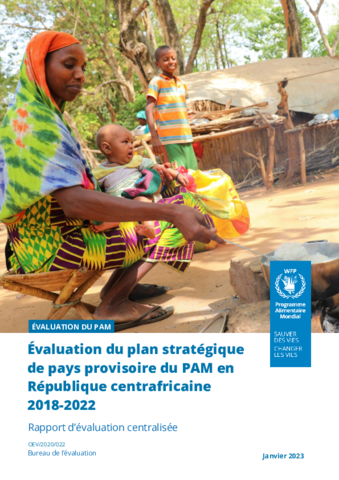
The evaluation was commissioned by the WFP independent Office of Evaluation to provide evaluative evidence for accountability and learning to inform the design of the next country strategic plan (CSP) in the Central African Republic.
It covers WFP activities implemented between 2018 and mid-2021 including WFP’s strategic positioning, its effectiveness in contributing to strategic outcomes, the efficiency of ICSP implementation and factors explaining WFP’s performance.
Overall, the evaluation observed that initial optimistic assumptions about the context, security level, emerging crises and partnerships did not materialize sufficiently to support the intervention logic, and the role of the ICSP as a strategic steering tool was limited.
In conclusion:
- WFP emergency actions were expanded without the expected degree of transition to early recovery assistance, with insufficient emphasis on supporting transformative effects.
- Longer-term approaches have been affected by low levels of funding, and stronger partnerships with other resilience actors should be further explored.
- While investments were made in cash transfers and digitalization, opportunities exist for WFP interventions to better consider the contextual specificities of the country.
- The operationalisation of the ICSP remained largely dependent on access, highlighting the need to integrate stabilisation and conflict analyses.
- Geographical prioritization remained a challenge, as well as precise individual targeting.
- Modest progress was observed in the integration and promotion of gender, protection, and equity across WFP activities.
- Despite rigidities in the ICSP framework, WFP was able to adapt to respond to the COVID-19 crisis and facilitated resource lending between activities.
- Capacity strengthening could have benefitted from stronger planning and linkages with operational issues.
- Room exists to explore new partnerships with other actors and joint approaches.
- WFP has strengthened its monitoring system, but more could be done to improve its quality and the use of evidence.



